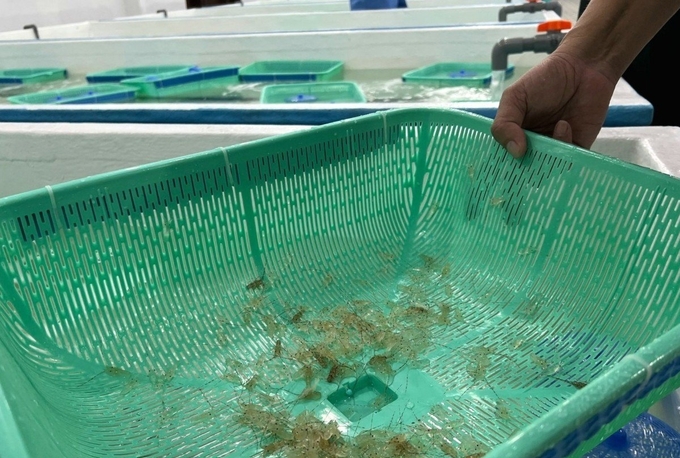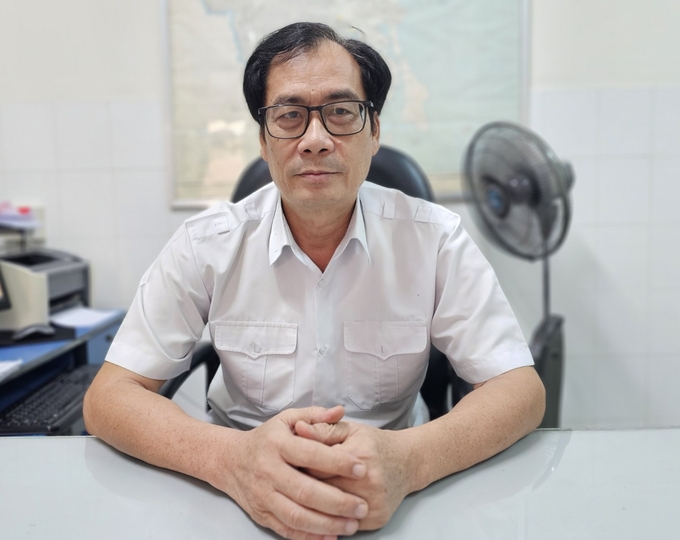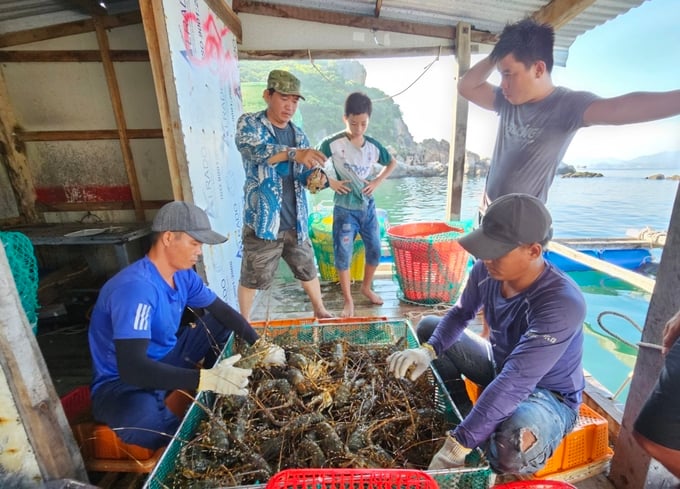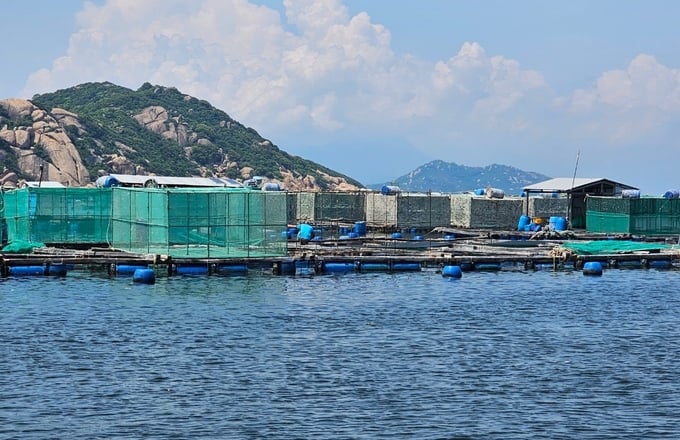May 24, 2025 | 16:25 GMT +7
May 24, 2025 | 16:25 GMT +7
Hotline: 0913.378.918
May 24, 2025 | 16:25 GMT +7
Hotline: 0913.378.918

Currently, lobster seeds are primarily imported from foreign countries to meet the aquaculture needs of the local population. Photo: KS.
According to the Department of Agriculture and Rural Development in Khanh Hoa Province, as of October, there are 74,330 lobster farming cages in the entire province, with a total output exceeding 1,500 tons. Currently, farmers focus on two main types of lobster: cotton lobster and green lobster. However, green lobster is more popular due to its shorter cultivation time, with harvests in just 8-10 months.
The lobster seed source is exploited in coastal areas of the province such as My Giang hamlet, Ninh Phuoc commune, and Nha Phu lagoon (Ninh Hoa town); Dam Mon hamlet (Van Thanh, Van Ninh district); Nha Trang Bay and Cam Ranh Bay, meeting only 10-15% of the demand. The remaining 85% of seeds are purchased from neighboring provinces such as Binh Dinh, Phu Yen, Ninh Thuan, Quang Ngai, Quang Nam, or imported from Malaysia, Singapore, and the Philippines.

Mr. Le Thang, Director of the Livestock and Veterinary Department in Khanh Hoa, advises lobster farmers to purchase seeds with a clear origin. Photo: KS.
However, natural lobster seed in the province is increasingly scarce, so the main source of seed is imported. In 2022, about 83 million lobster seeds (987 lots) were imported to Khanh Hoa. In the first 9 months of 2023, approximately 59 million lobster seeds (669 lots) were imported.
Mr. Le Thang, Head of the Department of Livestock and Veterinary in Khanh Hoa, stated that imported lobster seeds into Vietnam must have a certificate of inspection and quarantine issued by the authorized agency of the exporting country, confirming that the seafood is free from infectious diseases as per the World Organization for Animal Health regulations.
Recently, imported seeds are brought to quarantine facilities primarily in Cam Ranh City, where specialized agencies at the central level manage and control them according to the proper process from the border gate to the quarantine location. When a batch of lobsters with infectious diseases is detected, it is completely destroyed, and administrative penalties are imposed. At the same time, hygiene and disinfection are carried out at the quarantine facility.
According to Circular 26/2016/TT-BNNPNT dated June 30, 2016, by the Ministry of Agriculture and Rural Development, regarding animal inspection and aquatic animal products, from August 15, 2016, imported lobster seeds must be tested negative for white spot disease and white feces.
Recently, following the discovery of five imported shipments comprising nearly 1.4 million lobster seeds from Malaysia infected with the white spot disease virus, the Veterinary Department imposed administrative fines totaling VND 467 million on three importing companies. Simultaneously, the department proceeded to dispose of the entire shipment in accordance with regulations.
Dr. Nguyen Tan Sy, Deputy Director of the Institute of Aquaculture (Nha Trang University), emphasized the severe threat posed by the white spot disease in lobsters, with the potential to cause mass mortality, even up to 100% within a short period of cultivation. Therefore, when lobster seeds imported into the country are found to be carrying the white spot disease virus, they must be disposed of according to regulations.

The lobster seed is one of the critical factors determining the economic efficiency of aquaculture. Photo: KS.
Dr. Nguyen Tan Sy further stated that in 2021, the Institute of Aquaculture collaborated with Khanh Hoa Seafood Import Company to establish a quarantine facility for lobster seed in Cam Ranh City (Cam Ranh Aquatic Seed Quarantine Center). The center received certification of veterinary hygiene conditions (Certificate No. 96 dated September 7, 2021) from the Veterinary Department.
Initially, the Cam Ranh Aquatic Seed Quarantine Center was established to provide free support for importing companies to store lobster seeds for 5-7 days for disease control before releasing them into the market. Subsequently, the center implemented a fee for its services. However, from 2022 onwards, the center temporarily halted the quarantine of legally imported lobster seeds from Indonesia to Vietnam.
Dr. Nguyen Tan Sy also highlighted the current scarcity of lobster seed sources, leading some organizations to illegally import substandard seed without proper quarantine and inspection. Despite the risks associated with illegally imported, uninspected seed being lower in price, some farmers are compelled to purchase due to high demand. For farmers, it becomes a matter of luck whether they encounter issues with diseases.
On the other hand, Dr. Le Thang suggested that farmers, to avoid losses, should refrain from purchasing and cultivating lobster seeds of unclear origin. Instead, they should opt for high-quality, healthy lobster seeds with certificates of inspection and disease testing as per regulations. When purchasing, buyers should request documentation and invoices from sellers to verify the source and quality of the lobster seeds.

Currently, lobster farmers use a rolling wave stocking method, resulting in a substantial demand for lobster seed. Photo: KS.
To prevent losses in lobster seed farming, attention should be given to the storage time of seeds, ideally not exceeding 48 hours from the end of harvesting at sea to pond stocking. When releasing the seed, conditions should be ensured for the lobster to adapt to the new water environment without temperature shock, sufficient oxygen levels, salinity, pH, and alkalinity.
The Khanh Hoa Livestock and Veterinary Department will collaborate with relevant authorities to closely inspect and control lobster seed quarantine activities at quarantine facilities to ensure disease-free seed for farmers. Additionally, measures will be taken to administratively penalize, and even criminally prosecute, individuals and organizations intentionally evading quarantine and inspection, posing a risk of disease spread that affects farmers. Furthermore, the department will encourage citizens to purchase seed with a clear origin, certification of inspection, and proper registration for aquaculture in accordance with regulations.
According to the Department of Agriculture and Rural Development in Khanh Hoa Province, there are currently 27 certified facilities in the province capable of nurturing lobster seed. These facilities have developed appropriate lobster seed nurturing processes tailored to the needs of each unit. Additionally, there are 14 seafood import companies in the province, all located within Cam Ranh City.
Translated by Linh Linh

(VAN) The mutual export of agrifood products between the European Union (EU) and the United Kingdom (UK) must occur again without certification, border controls or other red tape. This was agreed at the UK-EU summit.
/2025/05/22/5121-2-173645_677.jpg)
(VAN) NBSAP Tracker identifies strengths and areas for improvement in the National Biodiversity Strategy, based on each region’s priorities and capacities.

(VAN) The draft amendment to the Circular on rice export trading stipulates a periodic reporting regime for rice exporting enterprises.

(VAN) Dong Thap farmers attained an average profit margin of 64% during the summer-autumn 2024 crop (first season), while An Giang and Kien Giang farmers followed with 56% and 54%, respectively.

(VAN) As a doctoral student doing research on renewable energy and electrification at Harvard University, the author shares his musings on electricity, nature, and countryside memories.

(VAN) The decree on Extended Producer Responsibility (EPR) ensures transparent management and disbursement of support funds, avoiding the creation of a “give-and-take” mechanism.

(VAN) Hue City rigorously enforces regulations regarding marine fishing and resource exploitation, with a particular emphasis on the monitoring of fishing vessels to prevent illegal, unreported, and unregulated (IUU) fishing.